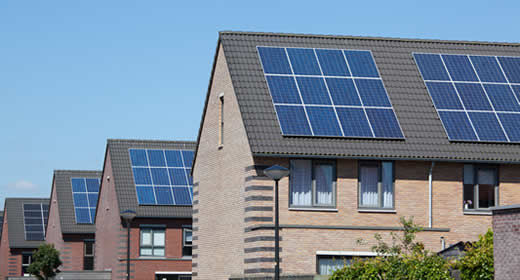
Approximately three out of every four Americans—76 percent—support hotly debated net energy metering policies, which allow residents with wind turbines and solar panels to sell excess energy back to the grid at retail rates. That’s according to a national poll by University of Michigan researchers.
The poll, conducted by the National Surveys on Energy and Environment, is believed to be the first nationally representative public opinion poll on the topic—though regional and industry pollsters have collected public opinions on net energy metering in the past.
The researchers found strong support for net energy metering, regardless of respondents’ age, political party, or even belief in climate change.
As an increasing number of Americans generate their own power, net energy metering has been the subject of much debate in legislatures across the nation. In the past two years, all but two states (Alaska and Wyoming) have discussed how to balance the interests of their electric utilities along with a public that wants to sell excess energy to the grid. Renewable energy advocates see the practice as a way to expand use of renewables and meet climate targets, but many utility companies argue that it unfairly favors solar customers.
“There are lots of rooftops, so lots of potential to generate power,” said Sarah Mills, a postdoctoral fellow at the Center for Local, State, and Urban Policy at U-M’s Ford School of Public Policy, which published the report findings. “But without net metering, rooftop solar makes less financial sense for homeowners—so it’s an important policy tool.”
That said, Mills points out that net energy metering is far less palatable to utilities.
“Like all other infrastructure, the utility grid has suffered from a lack of investment, and wasn’t built for 21st century clean energy,” she said. “Utility companies bear the cost of necessary infrastructure upgrades, while expressing concern that with net energy metering, rooftop solar customers, who operate as tiny electric utilities, are enjoying the benefits of grid connection without paying for maintaining that system.”
Poll results show that:
- 76 percent of self-identified moderates and 62 percent of self-identified conservatives support net energy metering.
- 72 percent of Americans age 50-64 and 66 percent of those 65 and older support net energy metering.
- 64 percent of respondents who said they don’t think there is solid evidence of climate change support net energy metering. And 74 percent of these same individuals support increasing the use of solar in their state.
As they work to balance these interests, some states have conducted formal solar valuation studies, aiming to put a price tag on both the economic costs and benefits of rooftop solar. Others have introduced or increased fixed fees for energy grid upgrades to residents who wish to sell their energy back to the grid. Other states are considering proposals about whether to allow groups of utility customers to collectively participate in net energy metering.
Interestingly, says Mills, public support for net energy metering is consistently positive, regardless of whether a state has passed legislation related to net energy metering. And there is no notable difference in opinion between Americans who live in states with mandatory renewable energy requirements and those who don’t.
“Though net metering has been a hotly debated topic in most states in recent years,” Mills said, “the public is clearly in support of it.”
The spring 2017 National Surveys on Energy and Environment (NSEE) surveyed 841 adult residents in the United States between April 17 and May 16. The survey is a joint effort of the Center for Local, State, and Urban Policy at U-M’s Ford School of Public Policy and the Muhlenberg Institute of Public Opinion at Muhlenberg College in Allentown, Pa. With a randomly selected sample, the margin of error for the survey is ±3.5 percent with a 95 percent confidence level.
For more information
- Read the full report: A Majority of Americans support net energy metering
- Contact the researcher: Sarah Mills, project manager and postdoctoral fellow
- Contact the Michigan News representative: Nicole Casal Moore, 734-647-7087, [email protected]